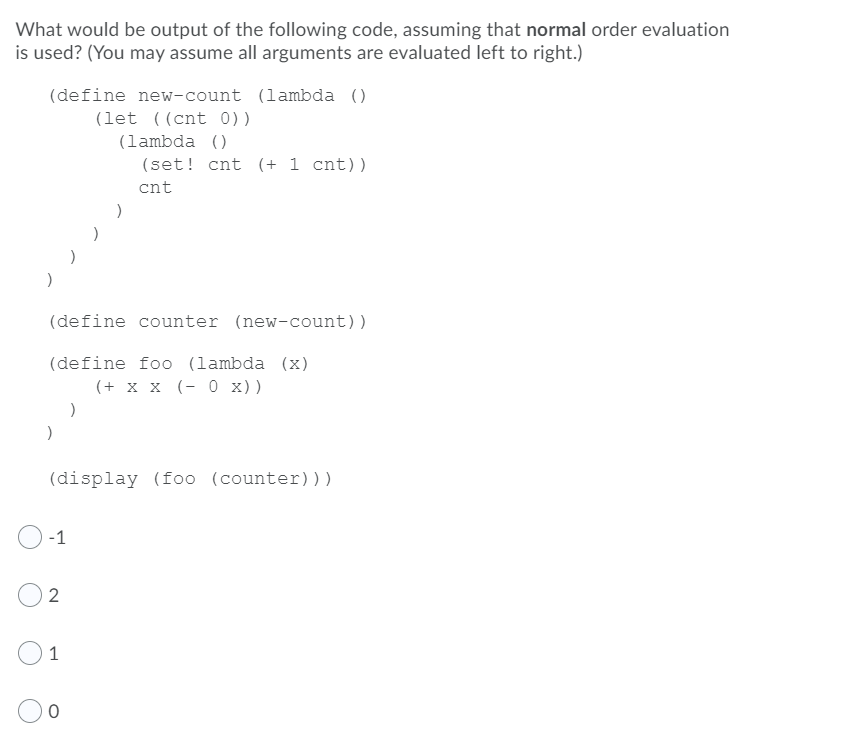What would be output of the following code, assuming that normal order evaluation is used? (You may assume all arguments are evaluated left to right.) (define new-count (lambda () (let ((cnt 0)) (lambda () (set! cnt (+ 1 cnt)) cnt (define counter (new-count)) (define foo (lambda (x) (+ x x (- 0 x)) (display (foo (counter))) O-1 O 2 O1
What would be output of the following code, assuming that normal order evaluation is used? (You may assume all arguments are evaluated left to right.) (define new-count (lambda () (let ((cnt 0)) (lambda () (set! cnt (+ 1 cnt)) cnt (define counter (new-count)) (define foo (lambda (x) (+ x x (- 0 x)) (display (foo (counter))) O-1 O 2 O1
Computer Networking: A Top-Down Approach (7th Edition)
7th Edition
ISBN:9780133594140
Author:James Kurose, Keith Ross
Publisher:James Kurose, Keith Ross
Chapter1: Computer Networks And The Internet
Section: Chapter Questions
Problem R1RQ: What is the difference between a host and an end system? List several different types of end...
Related questions
Question

Transcribed Image Text:What would be output of the following code, assuming that normal order evaluation
is used? (You may assume all arguments are evaluated left to right.)
(define new-count (lambda ()
(let ((cnt 0))
(lambda ()
(set! cnt (+ 1 cnt))
cnt
(define counter (new-count))
(define foo (lambda (x)
(+ x x (- 0 x))
(display (foo (counter)))
-1
1
![Suppose the following function foo was called with a list of size 8. How many
operations on the handler stack (push or pop) would result during the execution of
the function?
def foo(L):
try:
if len(L)
0:
==
return 0
else:
# convert L[0] to int
s = int (L[0])
# call foo w/ rest (L)
r = foo (L[1:])
return s + r
except ValueError:
return 0
10
18
16
2
Suppose the following Scheme expression was evaluated. How many times would
function foo be called?
(call/cc (lambda (c)
(define cont #f)
(call/cc (lambda (c)
(set! cont c)
(foo)
(cont foo)
1
infinity](/v2/_next/image?url=https%3A%2F%2Fcontent.bartleby.com%2Fqna-images%2Fquestion%2Fc533d133-3377-411d-b686-628bb40c81d4%2F01e4f92c-1efb-4ba4-98df-c2c3ef6c3517%2Fjbec49p_processed.jpeg&w=3840&q=75)
Transcribed Image Text:Suppose the following function foo was called with a list of size 8. How many
operations on the handler stack (push or pop) would result during the execution of
the function?
def foo(L):
try:
if len(L)
0:
==
return 0
else:
# convert L[0] to int
s = int (L[0])
# call foo w/ rest (L)
r = foo (L[1:])
return s + r
except ValueError:
return 0
10
18
16
2
Suppose the following Scheme expression was evaluated. How many times would
function foo be called?
(call/cc (lambda (c)
(define cont #f)
(call/cc (lambda (c)
(set! cont c)
(foo)
(cont foo)
1
infinity
Expert Solution
This question has been solved!
Explore an expertly crafted, step-by-step solution for a thorough understanding of key concepts.
This is a popular solution!
Trending now
This is a popular solution!
Step by step
Solved in 3 steps

Recommended textbooks for you

Computer Networking: A Top-Down Approach (7th Edi…
Computer Engineering
ISBN:
9780133594140
Author:
James Kurose, Keith Ross
Publisher:
PEARSON

Computer Organization and Design MIPS Edition, Fi…
Computer Engineering
ISBN:
9780124077263
Author:
David A. Patterson, John L. Hennessy
Publisher:
Elsevier Science

Network+ Guide to Networks (MindTap Course List)
Computer Engineering
ISBN:
9781337569330
Author:
Jill West, Tamara Dean, Jean Andrews
Publisher:
Cengage Learning

Computer Networking: A Top-Down Approach (7th Edi…
Computer Engineering
ISBN:
9780133594140
Author:
James Kurose, Keith Ross
Publisher:
PEARSON

Computer Organization and Design MIPS Edition, Fi…
Computer Engineering
ISBN:
9780124077263
Author:
David A. Patterson, John L. Hennessy
Publisher:
Elsevier Science

Network+ Guide to Networks (MindTap Course List)
Computer Engineering
ISBN:
9781337569330
Author:
Jill West, Tamara Dean, Jean Andrews
Publisher:
Cengage Learning

Concepts of Database Management
Computer Engineering
ISBN:
9781337093422
Author:
Joy L. Starks, Philip J. Pratt, Mary Z. Last
Publisher:
Cengage Learning

Prelude to Programming
Computer Engineering
ISBN:
9780133750423
Author:
VENIT, Stewart
Publisher:
Pearson Education

Sc Business Data Communications and Networking, T…
Computer Engineering
ISBN:
9781119368830
Author:
FITZGERALD
Publisher:
WILEY